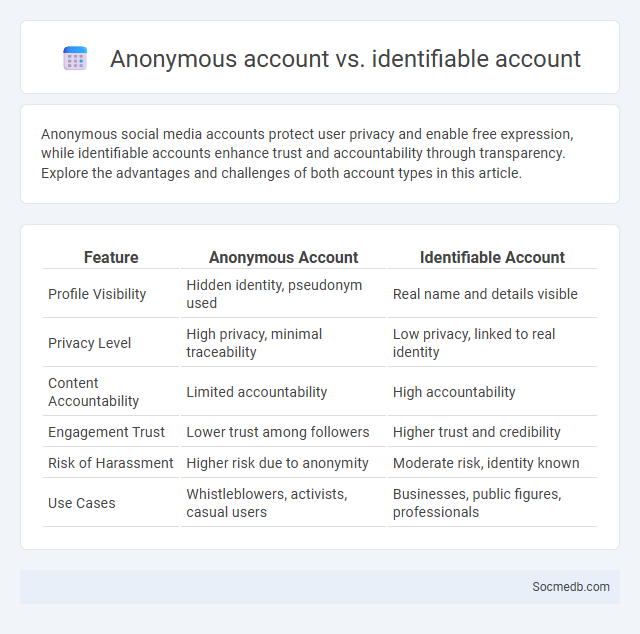
Photo illustration: Anonymous account vs Identifiable account
Anonymous social media accounts protect user privacy and enable free expression, while identifiable accounts enhance trust and accountability through transparency. Explore the advantages and challenges of both account types in this article.
Table of Comparison
| Feature | Anonymous Account | Identifiable Account |
|---|---|---|
| Profile Visibility | Hidden identity, pseudonym used | Real name and details visible |
| Privacy Level | High privacy, minimal traceability | Low privacy, linked to real identity |
| Content Accountability | Limited accountability | High accountability |
| Engagement Trust | Lower trust among followers | Higher trust and credibility |
| Risk of Harassment | Higher risk due to anonymity | Moderate risk, identity known |
| Use Cases | Whistleblowers, activists, casual users | Businesses, public figures, professionals |
Understanding Anonymous Accounts: Definition and Purpose
Anonymous accounts on social media platforms enable users to share content or engage without revealing their true identities, often promoting privacy and freedom of expression. These accounts are commonly used for sensitive topics, whistleblowing, or candid opinions that might be constrained by personal or professional repercussions. By allowing anonymity, these profiles contribute to diverse conversations while raising challenges in moderation and accountability.
Identifiable Accounts: Key Features and Benefits
Identifiable accounts on social media platforms enhance user trust by enabling transparent profiles linked to real-world identities, which reduce anonymity and harmful behavior. Features such as verified badges, consistent user information, and profile authenticity checks help distinguish genuine accounts from bots or impersonators. These attributes increase accountability, foster positive interactions, and improve overall platform security, benefiting both users and businesses.
Alt Accounts Explained: Uses and Motivations
Alt accounts, or alternative social media profiles, serve various purposes such as maintaining privacy, exploring different interests, or engaging with distinct communities without linking to one's primary identity. Users often create alt accounts to experiment with content, express opinions anonymously, or manage multiple personas for personal or professional reasons. Motivations behind alt accounts include avoiding algorithmic biases, protecting against online harassment, and separating different aspects of one's digital presence.
Privacy and Security: Comparing Account Types
Social media platforms offer various account types, each with distinct privacy and security features tailored to different user needs. Personal accounts typically provide customizable privacy settings, enabling users to control who can view their content, while business accounts prioritize data analytics and broader audience reach but may expose more personal information. Understanding the security protocols, such as two-factor authentication and data encryption available for each account type, is essential to protect user information effectively.
Accountability and Online Behavior
Maintaining accountability on social media is essential for fostering responsible online behavior and protecting your digital reputation. Transparent interactions, fact-checking before sharing content, and respecting diverse perspectives help create a trustworthy digital environment. Your consistent commitment to these principles reduces misinformation and promotes positive engagement across social platforms.
Authenticity and Credibility: Impact on User Perception
Authenticity and credibility on social media significantly shape user perception by fostering trust and engagement. Your audience values genuine content and transparent communication, which enhances brand loyalty and influence. Consistently reliable information strengthens your reputation and encourages meaningful connections.
Risk of Misuse: Trolls, Bots, and Malicious Activity
Social media platforms face significant risks of misuse from trolls, bots, and malicious activities that disrupt genuine user interactions. Trolls intentionally provoke and harass users, while bots automate spam, misinformation, and fake engagement, undermining platform integrity. These threats compromise online safety, amplify misinformation, and challenge content moderation efforts across major networks like Facebook, Twitter, and Instagram.
Community Guidelines and Policy Implications
Social media platforms enforce Community Guidelines to maintain safe and respectful interactions, addressing issues like hate speech, misinformation, and harassment. Violation of these guidelines can lead to content removal, account suspension, or legal consequences, reflecting significant policy implications for both users and providers. Your understanding of these rules is crucial to navigating online spaces responsibly and avoiding penalties.
Choosing the Right Account Type for Your Needs
Selecting the right social media account type hinges on your specific goals, whether personal branding, business promotion, or content creation. Personal accounts offer privacy and close connections, while professional or business accounts provide analytics, advertising tools, and enhanced visibility. Understanding your target audience and content strategy ensures your social media presence aligns with your objectives and maximizes engagement.
The Future of Online Identity: Trends and Predictions
The future of online identity is rapidly evolving, driven by advancements in decentralized technologies like blockchain, which enhance security and user control over personal data. Facial recognition and biometric authentication are becoming standard, providing more seamless and secure access to platforms. Your digital persona will integrate augmented reality and AI, creating immersive, personalized experiences that reshape social media interactions and privacy norms.
 socmedb.com
socmedb.com